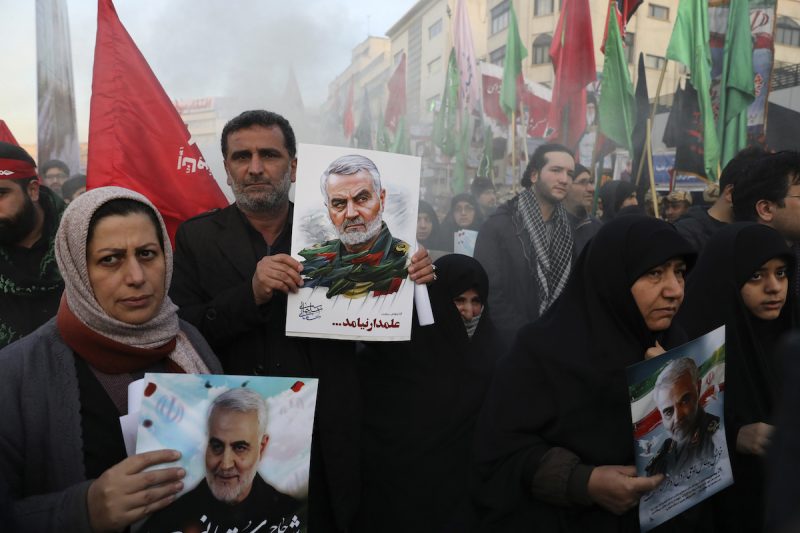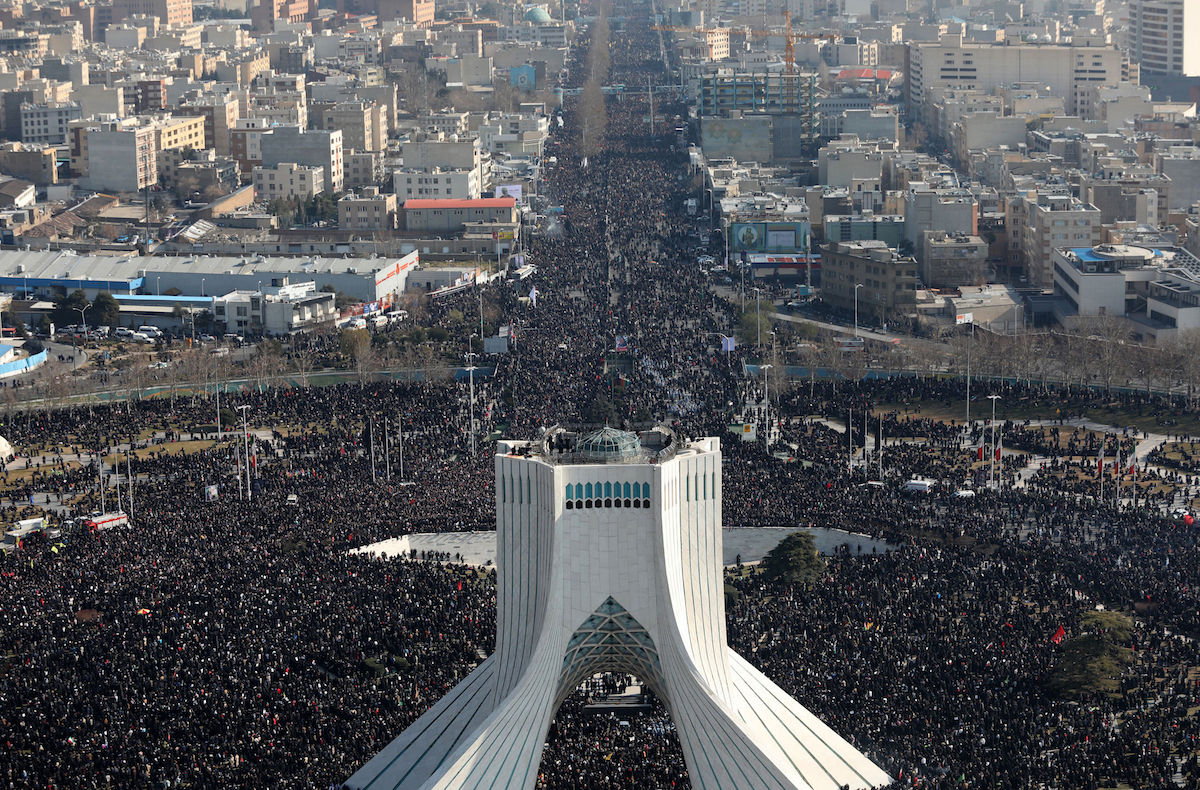- The top Iranian military commander Qassem Soleimani is to be buried in his hometown of Kerman this week after a three-day, multicity funeral procession following his assassination by a US drone.
- More than a million people have flooded the streets across four cities, with crowding getting so bad that dozens of people died in a stampede on Tuesday.
- Top Iranian leaders including Supreme Leader Ayatollah Ali Khamenei and President Hassan Rouhani also publicly paid their respects.
- The grandeur of Soleimani’s funeral highlights his hero status in the country and gives a glimpse of how hard Iran may be willing to strike back against the US.
- On Tuesday, Ali Shamkhani, Iran’s security chief, said that the country had drawn up 13 options for retaliation against the US and that even the weakest one would be a “historic nightmare.”
- Visit Business Insider’s homepage for more stories.
Funeral processions for Iran’s assassinated military commander Qassem Soleimani entered their third and final day on Tuesday, with more than a million people flooding the streets of his hometown to pay their respects.
The body of Soleimani, who was killed by a US drone in Baghdad on Friday, was flown via passenger jet into Iran earlier this week and paraded through the streets of multiple major cities including Tehran, Qom, Mashhad, and Ahvaz.
Soleimani is to be buried in Kerman, his hometown. The exact time of his burial is not yet clear, as officials postponed it after crowding at Tuesday’s funeral procession caused a stampede that killed dozens of people.
This is the first time Iran has honored an individual with a multicity funeral since the death of the Islamic Republic’s founder, Ayatollah Ruhollah Khomeini, in 1989, according to the Associated Press.


Top Iranian leaders - including the Supreme Leader Ayatollah Ali Khamenei, President Hassan Rouhani, and the head of Iran's Revolutionary Guard - also appeared in public to mourn Soleimani's death.
As the funeral procession waded through various crowds, black-clad mourners edged as close as they could to Soleimani's coffin to show their respects.
The procession in Tehran alone drew in more than 1 million people, the AP reported, and many mourners across cities chanted "Death to America," an often used refrain by anti-US Iranians.
Iranian MPs unanimously chanted "death to America" in the chamber to protest against Soleimani's assassination by the US.
For more, head here: https://t.co/hLfskzgSvz pic.twitter.com/6euRXQbapl
— Sky News (@SkyNews) January 5, 2020
Historic Funeral of Gen. Soleimani in Hometown Kerman pic.twitter.com/lC4VSxyNjg
— Fars News Agency (@EnglishFars) January 7, 2020
The jostling was so bad that some 32 people died in a stampede at the Kerman funeral procession on Tuesday, the AP reported, citing Iranian state TV. Many more were injured, the AP added.
All this shows how highly revered Soleimani was among Iranians, and it could hint at how hard the Iranian government is willing to strike back against the US to avenge his death.

Iran's leaders have vowed to avenge Soleimani's death and inflict pain and destruction on the US.
Khamenei also wept four times while giving Muslim funeral prayers beside Soleimani's body at Tehran University on Sunday.
He was joined by Rouhani, who warned the US had made a "grave mistake," and Soleimani's successor, Brig. Gen. Esmail Ghaani, who on Monday publicly vowed to carry out an "uprooting" of "the US from the region."

On Tuesday, Ali Shamkhani, Iran's security chief, said the government has discussed 13 "scenarios for vengeance" for the US, the state-run Fars news agency reported, according to BBC Monitoring and Bloomberg.
Shamkhani said even the weakest one would be a "historic nightmare" for the US.
Though the specific scenarios are unclear, Iran could attack US military operations around the region, unleash cyberwarriors to target banks and US power networks, or carry out terrorist attacks on US soil.

On Tuesday, Hossein Salami, the head of the Revolutionary Guard, told mourners, "We will take revenge, a hard and definitive revenge," according to Reuters.
"The martyr Qassem Soleimani is more dangerous to the enemy than Qassem Soleimani," Salami added, saying Iranian retaliation against the US would come at a time and place of Iran's choosing.
"We will burn the places they love," Salami added, according to translations from BBC Monitoring.
"We will burn the places they love"
IRGC Commander Hossein Salami reaffirms Iran's vow to avenge the death of Qasem Soleimani pic.twitter.com/bCqxco1nsL— BBC Monitoring (@BBCMonitoring) January 7, 2020
Maj. Gen. Hossein Dehghan, who advises the supreme leader, told CNN in an interview broadcast Sunday that Iran's response to the US would "for sure will be military and against military sites."
He added that if President Donald Trump went on with his threat to destroy Iranian cultural sites, "No American military staff, no American political center, no American military base, no American vessel will be safe."
A eulogist in Mashhad on Sunday also told mourners that anyone who assassinated Trump - who directed the strike on Soleimani - should receive an $80 million bounty.
It's not clear whether this call was sanctioned by the Iranian government.
- Read more:
- Soleimani's daughter warns at his funeral that families of US troops 'will spend their days waiting for the death of their children'
- Trump's order to kill Iran's top general has sparked a catastrophe of his own making and left him globally isolated
- Why Iran's Qassem Soleimani was on a not-so-secret trip to Iraq when he was assassinated
- Iran has vowed revenge on the US after Trump's airstrike killed its top military commander. Here's how it could happen.

